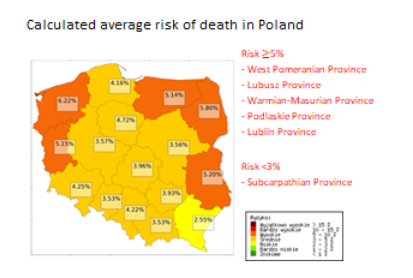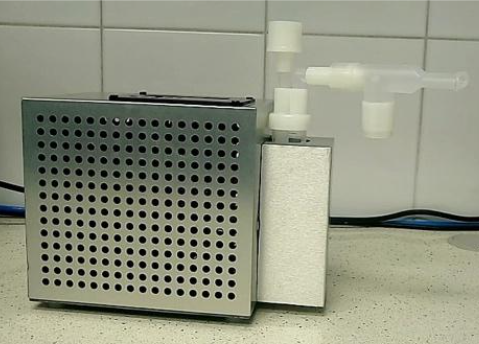Laboratory for Research on Civilisation Diseases
Department of Family Medicine
Faculty of Medicine
ABOUT US
The Laboratory for Research on Civilisation Diseasess was established as part of the ‘Initiative of Excellence – Research University’ programme as a core facility at the Department of Family Medicine. The unit conducts research on civilisation diseases under the supervision of the Department’s team.
Research team members:
- Prof. Dr. Habil. Janusz Siebert
- Piotr Gutknecht, M.D., Ph.D.
- Bartosz Trzeciak, M.D., Ph.D.
- Milena Dybowska, M.D.
- Rafał Czaja, M.D..
SCOPE OF WORK
1. Coordinated care in primary healthcare. Research facilities – Family Medicine Centre, Medical University of Gdańsk
Scope
- Diagnostics and treatment of prediabetes and diabetes,
- Diagnostics and treatment of hyperthyroidism, diagnostics and treatment of hypothyroidism, and diagnostics of single and multiple thyroid nodules,
- Diagnostics and treatment of chronic kidney disease,
- Pulmonology – including COPD and asthma,
- Cardiology – atrial fibrillation, heart failure, stable coronary artery disease.
2. Use of the multifunctional analyser for diagnostics and therapy monitoring in patients with symptoms of musculoskeletal disorders in the course of neurological conditions, after trauma or invasive treatment and in occupational medicine examinations.
Collaboration within the Mechanical and Medical Engineering programme with the Gdańsk University of Technology, Institute of Mechanics and Machine Design, headed by Prof. Dr. Habil. Wiktoria Wojnicz. Department of Rehabilitation Medicine, Medical University of Gdańsk and University Clinical Centre – headed by Prof. Dr. Habil. Dominika Szalewska, M.D..
Experience in the field: an exoskeleton was developed to support upper limb movements in individuals with Duchenne muscular dystrophy. Patent P.439272 was obtained (PG, Medical University of Gdańsk, IRPARK Sp. z o.o.). The work was carried out as part of the E-Pionier project (WG-POPC.03.03.00-00-0008/16-00).
3. Research on risk factors for cardiovascular events based on telemetry methods, using, among others, the SCORE and SCORE 2 algorithms, the Cardiovascular Diseases programme, and the My Health programme – programmes primarily addressing cardiovascular diseases.
Collaboration: Regional Digital Medicine Centre, Family Medicine Centre of the Medical University of Gdańsk, primary care physician practices, and outpatient clinic of occupational health.
The introduction of coordinated care in primary care obliges us to create diagnostic and educational tools. Developed in conjunction with Dr. Habil. Eng. Szymon Grymek from the Gdańsk University of Technology, the online version of the SCORE 2 programmes has been integrated into the IT system of the Family Medicine Centre of the Medical University of Gdańsk.
In Poland, the scale of the problem involves more than 25,000 primary care physicians and specialists in outpatient specialist care. In order to relieve the burden on medical staff, it is important to shift the assessment of screening diagnostics to the population using the Internet.
Proposal:
An online platform for data integration and collaboration between medical research teams to determine the epidemiological profile of the Polish population in terms of the probability of cardiovascular death.
The thematic scope includes the use of data obtained by internet users or physicians for:
1. assessing the risk of cardiovascular death- in the internet user population
- among patients of primary care physicians and specialist outpatient care.
2. creating an automatic analysis of recommendations
- to eliminate risk factors
- for medical follow-up
3. automatic distribution of risk factors and calculated risk values on a map of Poland
4. monitoring the efficacy of treatment by primary care physicians and specialists in other fields.
Centre Experience and Research Status
The Department of Family Medicine team has been conducting research in this area since 2004. This has resulted in scientific publications and a doctoral dissertation. The system has been implemented in medical practice.
The replacement of the SCORE algorithm with SCORE 2 algorithm requires the programme to be rebuilt based on new indicators. The potential benefits are particularly significant after the introduction of coordinated primary care.
- Evaluating the risk of death or cardiovascular events in the observed population enabled the development of diagnostic algorithms. One of the most popular was the SCORE algorithm. Based on this algorithm, the Department of Family Medicine, Chair of Family Medicine, Intercollegiate Cardiology Centre of the Medical University of Gdańsk, and Gdańsk University of Technology developed a web application www.ryzyko.gumed.edu.pl. The programme was based on the ten-year mortality risk assessment algorithm published in EHJ (2003) 24,987-1003.
- The study was conducted from 2004 to 2022. The study group consisted of internet users who solved the algorithm. The analysis took into account gender, age, total cholesterol level, systolic blood pressure, and presence of smoking. For epidemiological purposes, the presence of diabetes and coronary heart disease was also taken into account. The risk index was calculated automatically. The data was plotted on a map of Poland.

Fig. 1. Graphical presentation of the risk of death from cardiovascular causes in Poland according to the SCORE algorithm
The results obtained from the programme, implemented based on the SCORE algorithm between 2004 and 2022, were presented in five publications.
4. Biologically active substances in the exhaled breath of individuals with various disease
The project aims to determine whether exhaled breath condensates contain reliable biomarkers that would allow for a simple assessment of the efficacy of therapy. For this purpose, the condensates will be subjected to metabolomic profiling and the obtained results will be subjected to statistical analysis.
Centre Experience:
We conducted studies on individuals with morbid obesity before and after bariatric treatment.
Currently, we are testing exhaled breath condensates at the Clinic of Pneumonology, University Clinical Centre (UCK), for biomarkers in patients with idiopathic pulmonary fibrosis, as part of the ABM programme “Evaluation of the effect of Wharton’s jelly mesenchymal stem cells (WJ-MSCs) preparation in the treatment of fibrosing interstitial lung diseases,” acronym: MSC-FIBRO.
Collaboration – Department of Medical Immunology, headed by Prof. Dr. Habil. Piotr Trzonkowski, M.D., and Department of Pharmaceutical Chemistry, headed by Prof. Dr. Habil. Tomasz Bączek.
In collaboration with the Gdańsk University of Technology, a research device was developed and a European patent obtained.

Fig. 2. Devices for collecting exhaled breath condensates, manufactured at the Gdańsk Medical University and Gdańsk University of Technology

5. Non-invasive hemodynamic studies in patients with hypertension, heart failure, and chronic kidney disease using impedance cardiography, applanation tonometry, and 24-hour blood pressure monitoring.
The Centre’s experience includes many years of using impedance cardiography and appendage tonometry for cardiovascular examinations in numerous diseases. The research resulted in the creation of an outpatient monitoring system for patients with heart failure, in collaboration with the Military Medical Institute in Warsaw (as part of the NCIBR STRATEGMED 3 programme, ID 305274, acronym AMULET – “A new model of medical care using modern methods of non-invasive clinical assessment and telemedicine in patients with heart failure”).
CONTACT
Laboratory for Research on Civilisation Diseases
Department of Family Medicine
Medical University of Gdańsk
Dębinki 2 St.
80-211 Gdańsk
Mail kmr@gumed.edu.pl
Phone: 58 349 15 75
Photo private archive